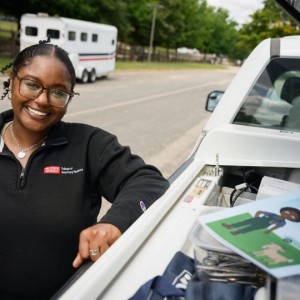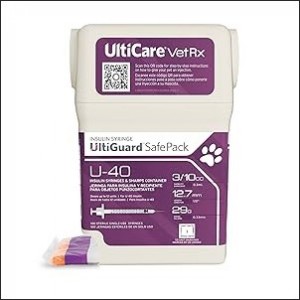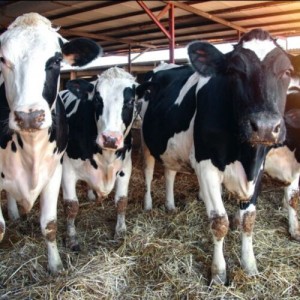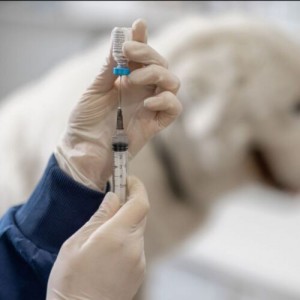U of Florida professor: Practice good hygiene with any infected animal
by Mary Guiden
It’s a message most pet owners hate to share: A beloved animal is battling an illness or disease. But when that animal is Emmanuel the emu, the news goes viral. Now, infectious disease experts and veterinarians are reminding people about precautions to take to prevent the spread of disease.
The public embraced Emmanuel’s charismatic and fussy personality — shared with the world on social media in early 2022 by his owner, Taylor Blake — and led to an appearance on “The Tonight Show” with Jimmy Fallon in July. Knuckle Bump Farms, where they live in South Florida, has 2.4 million followers on TikTok and more than 900,000 followers on Instagram. Blake has nearly 900,000 followers on Twitter as of Oct. 17.
The news she shared on Oct. 15 sent shock waves among the farm’s fans.
“We had a massive tragedy strike the farm,” Blake wrote on Twitter. “Our farm was heavily impacted by wild geese bringing in [Avian influenza], and we lost 99% of the birds on our farm.” In her posts, Blake said the family lost every chicken and duck on the farm along with geese, two female black swans and turkeys.
“We lost 50+ birds in 3 days,” she wrote. Emmanuel had been fine until Oct. 12. “Emmanuel unexpectedly went down,” she wrote on Twitter.
Blake has continued to post photos of Emmanuel going through a recovery process and what she describes as physical therapy. The photos show her snuggling with the emu and kissing his head.
Wear a mask, gloves around infected animals
Jim Wellehan, an associate professor in the College of Veterinary Medicine at the University of Florida, said that he strongly advises practicing good hygiene with any infected animal.
“If it’s an infected human, emu or any animal and you strongly suspect an infectious disease, wear a mask and gloves so that the animal is not contaminating anything or anyone with potential infectious material,” he said.
Wellehan studies the evolution and ecology of pathogens of nondomestic animals, with an emphasis on molecular diagnostics and pathogen discovery.
“When we see wild birds at the University of Florida, we wear gloves and a mask until we get a negative influenza test,” he said. “If we bring a virus in and we kill all the other birds, we’re not helping anybody.”
The Florida Fish and Wildlife Conservation Commission is monitoring for Highly Pathogenic Avian Influenza (HPAI) in birds found sick or dead of unknown causes. In a recent post on its website, the commission said it has found ongoing black vulture mortalities from HPAI throughout peninsular Florida.
Wellehan acknowledged that HPAI is killing large numbers of birds in the state. “I used to see black vultures and turkey vultures, but black vultures are dying,” he said.
Data he’s seen recently from organizations including the University of Minnesota Raptor Center raise more questions.
Wellehan said while influenza is viewed as a respiratory virus, the research he’s seen from Minnesota found elevated levels of the virus in the birds’ brains and other tissues, but no virus in the lungs. The study was led by Dr. Dana Franzen-Klein, a veterinarian and medical director at the raptor center.
Avian flu, or something else?
Wellehan said that he is also not sure — based on what he’s read to date — that Emmanuel has Highly Pathogenic Avian Influenza. Eastern equine encephalitis, typically transmitted by mosquitos, could be the culprit.
“We do have a vaccine and we can prevent this virus in emus,” he said. This type of encephalitis can also be deadly; it’s currently listed as a bioterrorism agent.
Following publication of this story, Taylor posted on Twitter on Oct. 22 that Emmanuel tested negative for avian flu, West Nile virus and other infectious diseases. She said that she believes his condition stemmed from the stress of seeing state officials in Hazmat suits euthanize other birds on the farm.
Last month, the University of Florida’s marine animal rescue team identified an unexpected infection of HPAI in a dead bottle nose dolphin. According to a university news story, this was the first cetacean to be found with the virus in America and only the second known case in the world. Researchers said they suspect the dolphin likely got infected by interacting with a wild bird killed by HPAI.
The U.S. Department of Agriculture’s Animal and Plant Health Inspection Service tracks Highly Pathogenic Avian Influenza on its website.
Read the Oct. 16 story on Emmanuel’s plight on The Washington Post’s website. CNN, The Wall Street Journal, HuffPost, NBC News and other outlets are also following this story.


.png)











List
Add
Please enter a comment